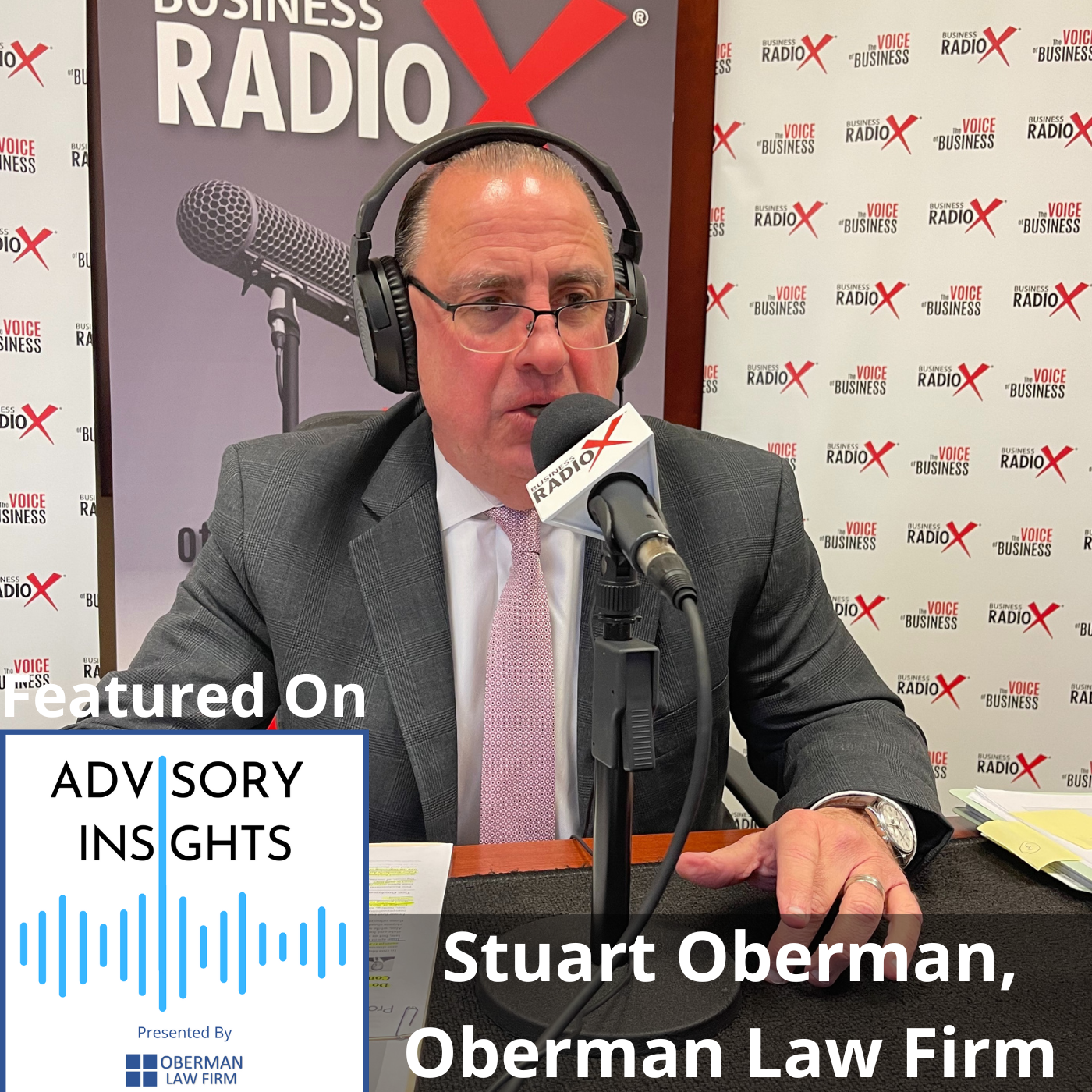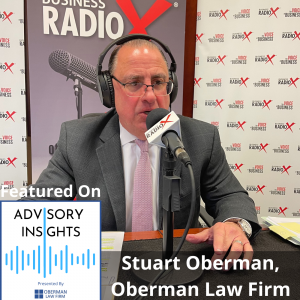
Regulatory Concerns for 2023 (Advisory Insights Podcast, Episode 17)
On this episode of Advisory Insights, Stuart Oberman of Oberman Law Firm looked ahead to 2023 and covered some of the basic HR-related compliance reviews businesses should conduct at year end 2022, including manuals and checklists, time tracking and overtime policies, employee vs. contractor classification, and more. Stuart also urged employers use this time to verify their compliance with the FLSA, the Affordable Care Act, the Americans with Disabilities Act, OSHA, and EEOC.
Advisory Insights is presented by Oberman Law Firm and produced by the North Fulton studio of Business RadioX®. The series can be found on all the major podcast apps. You can find the complete show archive here.
TRANSCRIPT
Intro: [00:00:01] Broadcasting from the studios of Business RadioX, it’s time for Advisory Insights. Brought to you by Oberman Law Firm, serving clients nationwide with tailored service and exceptional results. Now, here’s your host.
Stuart Oberman: [00:00:20] Welcome everyone to Advisory Insights. This is Stuart Oberman. Well, I’ll tell you, folks, 2023 is almost here. So, at this time of year, it is a mad, mad scramble to get everything organized, closed out for 2022, and then see what we have for 2023. So, this is a perfect, perfect time that our clients, big or small, whether you make $100,000 a year or whether you’re half-a-billion to a billion dollars, it’s all, all, all regulatory time. So, what are we going to cover?
Stuart Oberman: [00:01:30] As we review regulatory concerns for 2023, it’s a mad scramble now. Our clients, whether they’re big, they’re small, whether they make $1,000 a year or half-a-billion dollars or a billion dollars, it is all regulatory time. So, what I want to do is really take a look at what are the basic things that you need to really look at on an H.R. Process, whether it is local, regional, national landscape. Human resources is an extremely, extremely hot topic right now.
Stuart Oberman: [00:02:01] You know, when you have states that are regulating hair color, when you have states that are regulating non-compete agreements, when you have states regulating background checks, whether we have employee classification issues, whether we have IRS issues, let’s take a quick look at some of the things that we need to look at and what everyone needs to look at as a checklist for 2023 starting today.
Stuart Oberman: [00:02:28] One, I want everyone to do a complete compliance review. What does that mean? That means all your manuals, all your checklists, all your personnel issues, all your tax forms, whatever you need to do to make sure that those personnel files are absolutely in order we need to take a look at.
Stuart Oberman: [00:02:50] Second step in this wonderful world that we live in of the revolving employee coming and going, boomeranging, the great resignation. I forgot the biggest term now is a great – I don’t know, where employees just sort of float along and they really don’t check in or check out. They just float and, eventually, wait to be fired.
Stuart Oberman: [00:03:13] I want you to take a look at hiring and recruiting, you know, what is your onboarding process. That’s the next one, employee onboarding. Do you have the regulatory matters? Do you have the offer letters, which we’re going to cover in another episode. Do you have the background checks? Are you granted permission to do background checks? Are you granted permission to do criminal checks? I mean, these are the things that you really, really have to take a look at as far as onboarding goes.
Stuart Oberman: [00:03:42] Do you have a training process in place for the employees or are they just sort of floundering? Have they received non-disclosure agreements? Have they received social media, cell phone, internet policy agreements? These are all the things that you need to handle right when they start the first day.
Stuart Oberman: [00:03:58] So then, let’s take a look at our payroll and time keeping measures. Huge topic issue. Are you properly paying your employees for overtime? We’re going to cover that issue as it relates to commuting employees in a couple episodes down the road. But how are you paying your employees? Are they W-2? Are they 1099? Are you paying them for travel time to the job, paying spending the night? Are you traveling?
Stuart Oberman: [00:04:25] You know, we’re going to get into a little bit of the The Portal-to-Portal Act. You’re probably thinking, what in the world is that? Well, that’s an early, early law that’s been around for about 60 or 70 years that, honestly, most H.R. people do not know about. So, timekeeping measures. Are you tracking time? How are you tracking time? Is it manual? Is it by computer? Is it by software?
Stuart Oberman: [00:04:48] Because what happens is we have some employers that will not pay their staff overtime until they reach 46 hours. Now, there’s a five hour gap there every week. That can be very, very costly. Do you have a policy in place? Is your OT policy, whatever that may be – I’ll use the word defensible – defensible? Is it defensible against the IRS? Is it defensible against the Department of Labor, no matter where your state is, or federal? What do those things look like?
Stuart Oberman: [00:05:26] Classification, independent contractor or employee. Do you pass the simple smell test? I think it was back in ’84, I believe, or the early ’80s, the IRS set up 20 checkmarks, if you will, on what you need to look at to determine whether a person is an employee or independent contractor. Are we looking at the control test? The old saying, if you control the time, place, and manner of an individual, they are an employee. So, that could be a very, very, very costly mistake.
Stuart Oberman: [00:06:05] Next question is proper record considerations. Are you keeping track of those? So, there’s a couple of things you need to look at when you’re saying you’re tracking those. So, I want you to take a look at do you comply with the Fair Labor Standards Act, FLSA, the minimum wage, overtime? Should that be reviewed? Absolutely. Are you looking at the Affordable Care Act? Do you comply with that? Simple things. Do you have enough employees to comply with those areas? American with Disabilities Act, the ADA, are you looking at those? Occupational Safe and Health Act, OSHA – OSHA, the big guys. Family Medical Leave Act, are you looking at that, FMLA, 50 employees or over?
Stuart Oberman: [00:06:53] Do some of your employees that are 15 or some of your companies that are 15 and more employees, do they qualify for that? And then, the beloved agency, the EEOC, which is a nasty, nasty governmental organization that, really, I say nasty, but they do a lot of good things. And we’re going to cover some areas on that down the road.
Stuart Oberman: [00:07:15] So, what are the next things? EEOC retaliation. So, if your employee reports you to a governmental agency or state agency or even a local agency, and you retaliate, well, what does that mean? You can’t fire, you can’t demote, you can’t reprimand, you can’t punish your employees because they simply went ahead and reported you, which they are allowed to do. The question is, how do you deal with that internally and do you have a retaliation process? That has to be reviewed. You’ve got to look at your H.R. You have to have specific guidelines for non-retaliation.
Stuart Oberman: [00:07:57] And, lastly, I’m going to take a look at federal guidelines for 15 or more employees. Now, have you even looked at whether or not the FLSA even applies to you? The question is it will. Affordable Care Act, Medical Disabilities Act, OSHA, FMLA, EEOC, do those even apply to you if you have 15 or more employees? If you don’t know the answer to that question, you’re way out of compliance.
Stuart Oberman: [00:08:24] And I would urge everyone to take a look at what their guidelines are, ask questions, seek counsel, go to the C-suites of your company. And if you are not in compliance, now is an absolute great time because people wait to the second, third, fourth quarter to do this. Now’s the time to deal with it going into 2023.
Stuart Oberman: [00:08:49] Folks, that is our H.R. concerns for 2023 entering. I want you to really take a look at these things and make sure because it is really a trap for the unwary if you are not.
Stuart Oberman: [00:09:02] Folks, Stuart Oberman, Oberman Law Firm and Advisory Insights. If you have any questions, please feel free to contact me at 770-886-2400 or email stuart, S-T-U-A-R-T, @obermanlaw.com. We’re going to have some great, great topics to follow on our next podcast. So, everyone, have a fantastic day. Thank you.
Outro: [00:09:25] Thank you for joining us on Advisory Insights. This show is brought to you by Oberman Law Firm, a business-centric law firm representing local, regional, and national clients in a wide range of practice areas, including health care, mergers and acquisitions, corporate transactions, and regulatory compliance.
About Advisory Insights Podcast
Presented by Oberman Law Firm, Advisory Insights Podcast covers legal, business, HR, and other topics of vital concern to healthcare practices and other business owners. This show series can be found here as well as on all the major podcast apps.
Stuart Oberman, Oberman Law Firm

Stuart Oberman, Founder, Oberman Law Firm
Stuart Oberman is the founder and President of Oberman Law Firm. Mr. Oberman graduated from Urbana University and received his law degree from John Marshall Law School. Mr. Oberman has been practicing law for over 25 years, and before going into private practice, Mr. Oberman was in-house counsel for a Fortune 500 Company. Mr. Oberman is widely regarded as the go-to attorney in the area of Dental Law, which includes DSO formation, corporate business structures, mergers and acquisitions, regulatory compliance, advertising regulations, HIPAA, Compliance, and employment law regulations that affect dental practices.
In addition, Mr. Oberman’s expertise in the healthcare industry includes advising clients in the complex regulatory landscape as it relates to telehealth and telemedicine, including compliance of corporate structures, third-party reimbursement, contract negotiations, technology, health care fraud, and abuse law (Anti-Kickback Statute and the State Law), professional liability risk management, federal and state regulations.
As the long-term care industry evolves, Mr. Oberman has the knowledge and experience to guide clients in the long-term care sector with respect to corporate and regulatory matters, assisted living facilities, continuing care retirement communities (CCRCs). In addition, Mr. Oberman’s practice also focuses on health care facility acquisitions and other changes of ownership, as well as related licensure and Medicare/Medicaid certification matters, CCRC registrations, long-term care/skilled nursing facility management, operating agreements, assisted living licensure matters, and health care joint ventures.
In addition to his expertise in the health care industry, Mr. Oberman has a nationwide practice that focuses on all facets of contractual disputes, including corporate governance, fiduciary duty, trade secrets, unfair competition, covenants not to compete, trademark and copyright infringement, fraud, and deceptive trade practices, and other business-related matters. Mr. Oberman also represents clients throughout the United States in a wide range of practice areas, including mergers & acquisitions, partnership agreements, commercial real estate, entity formation, employment law, commercial leasing, intellectual property, and HIPAA/OSHA compliance.
Mr. Oberman is a national lecturer and has published articles in the U.S. and Canada.
Oberman Law Firm
Oberman Law Firm has a long history of civic service, noted national, regional, and local clients, and stands among the Southeast’s eminent and fast-growing full-service law firms. Oberman Law Firm’s areas of practice include Business Planning, Commercial & Technology Transactions, Corporate, Employment & Labor, Estate Planning, Health Care, Intellectual Property, Litigation, Privacy & Data Security, and Real Estate.
By meeting their client’s goals and becoming a trusted partner and advocate for our clients, their attorneys are recognized as legal go-getters who provide value-added service. Their attorneys understand that in a rapidly changing legal market, clients have new expectations, constantly evolving choices, and operate in an environment of heightened reputational and commercial risk.
Oberman Law Firm’s strength is its ability to solve complex legal problems by collaborating across borders and practice areas.
Connect with Oberman Law Firm:
Company website | LinkedIn | Twitter
















